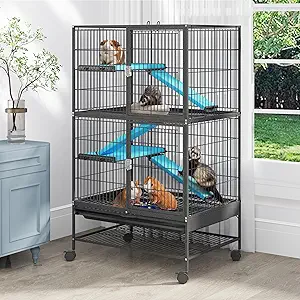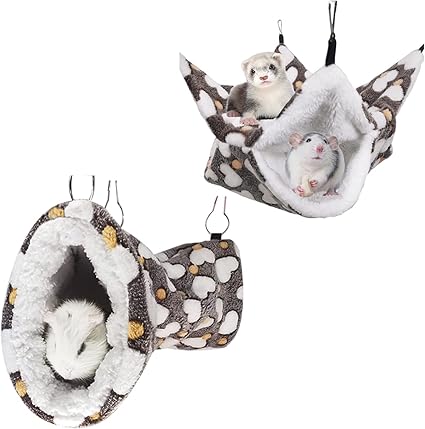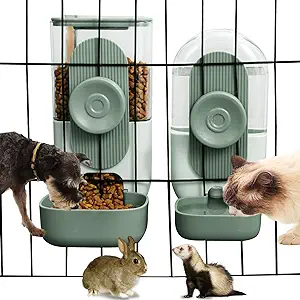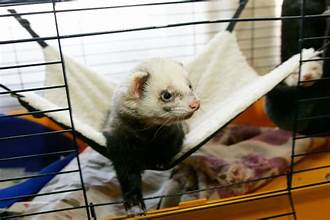So you’ve decided to welcome a ferret into your life – fantastic choice! These playful, curious creatures are bundles of joy, but like any pet, they need a comfortable and stimulating environment to thrive.
The Ferret Fortress: Cages Options
There are a variety of ferret cages available, each with its pros and cons:
Ferrets are energetic and love to explore.
The minimum recommended cage size for a ferret is 30″ x 24″ x 36″, but bigger is always better. Consider adopting two ferrets, as they are social animals who enjoy each other’s company. If you go this route, double the recommended space! Look for a cage with multiple levels connected by ramps or tubes, allowing ferrets to climb and fulfill their instinct to burrow. Remember, social interaction is crucial for their well-being.

Multi-level wire cages are the most popular option, offering good ventilation and visibility. Choose a cage with close bar spacing (no more than 1 inch) to prevent escapes. Opt for a solid bottom pan cage to collect waste and make cleaning easier. Look for cages with wheels for easy mobility. Popular options include Ferret Nation Double Unit Cage and Prevue Feisty Ferret Home.
Wood ferret condos:
While aesthetically pleasing, these are difficult to clean and may harbor bacteria. Make sure the wood is untreated and safe for ferrets to chew on.
Must-Have Habitat Essentials
Once you have a cage, you’ll need to furnish it with ferret-approved essentials:
Cozy Sleep Zones:
Ferrets love to burrow and nap. Provide comfy hammocks, beds, and ferret-safe fleece blankets for snoozing.

Climbing Contraptions:
Ferrets are natural climbers. To satisfy their adventurous spirit, include ramps, shelves, and tubes. EveryYay Feisty Ferret Home has platforms and ramps, while Ferplast Ferret Tower offers an elaborate climbing structure.
Litter Box Basics:
Ferrets are relatively clean animals, and litter box training is achievable. Place a shallow litter box in a corner of the cage, using ferret-safe litter like recycled paper pellets. Remember to scoop daily!
Bedding:
Avoid cedar chips and pine shavings, which can irritate your ferret’s respiratory system. Instead, opt for comfortable, absorbent bedding like recycled paper or fleece.
Sleeping cubbies:
Ferrets love to nap, so provide them with cozy hammocks, hides, or small beds to curl up in.
Playtime essentials:
Ferrets are playful and need toys to keep them stimulated. Rotate various toys, including tunnels, balls, and crinkly toys.
Food and Water Dishes:
Select shallow, tip-proof dishes that can be easily removed for cleaning.

Beyond the Cage: Playtime and Enrichment
Ferret-Safe Fun:
Provide a variety of ferret-safe toys to keep your pet entertained. PVC pipes, balls, and crinkly tunnels are all ferret favorites.
Supervised Exploration:
Ferret-proof a room and allow your ferret supervised playtime outside the cage. It is crucial for exercise and mental stimulation.
Keeping it Clean:
Spot clean your ferret’s cage daily, and perform a complete cleaning with a ferret-safe disinfectant weekly. Remember, a clean cage equals a healthy ferret!
Proper planning and these essential elements allow you to create a fantastic ferret habitat that fosters your pet’s well-being and happiness. Remember, a happy ferret is a playful ferret, and that’s a joy to behold! Your Responsibility and Care Make the Difference
Safety First:
Cage Material:
Wire cages are the most popular option as they provide good ventilation and are easy to clean. Ensure the bar spacing is narrow enough to prevent escapes (typically no more than 1 inch).
Secure Doors:
Look for cages with locks or latches that your ferret can’t pry open.
No Sharp Edges:
Avoid sharp edges or corners that could injure your ferret.
Skip the Chew Toys:
Ferrets are notorious chewers, so avoid giving them anything they can easily swallow, or that could cause intestinal blockages. Instead, provide them with safe ferret toys designed for chewing.
Beyond the Cage:
While a cage is essential for providing your ferret with a safe and secure home base, it’s crucial to allow daily supervised playtime outside the cage. This gives them much-needed exercise and strengthens their bond with furry friends. You can ferret-proof a room in your house or create a playpen using exercise panels to create a safe space for supervised exploration.




